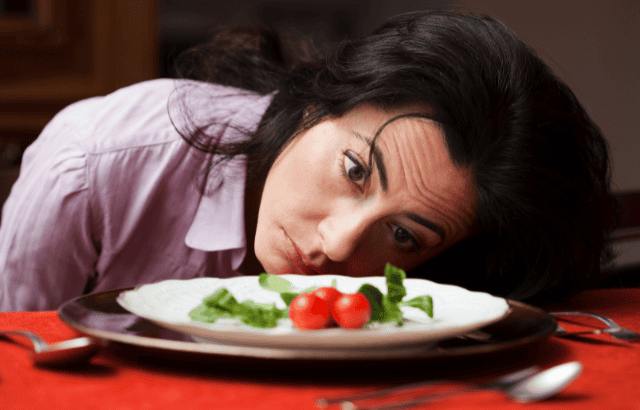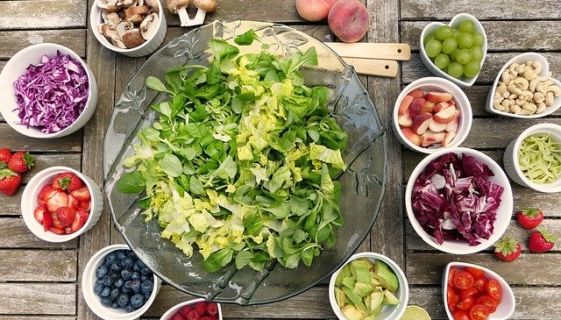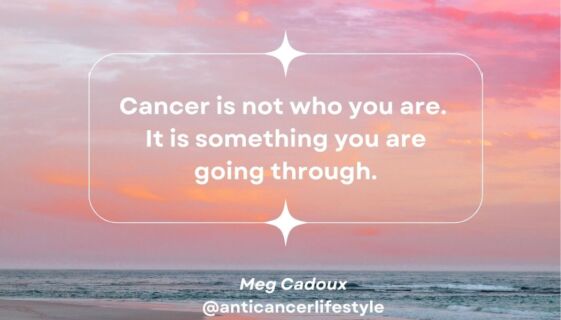Most of us feel social pressure to look at least somewhat trim. This can often lead to restricting certain food groups and weight cycling (or “yo-yo” dieting), which is repeated weight loss from dieting, followed by regaining it back. Our relationship with food can easily become distorted and fearful, resulting in negative effects on our food choices.
I’d ask you to consider that healthy eating is not just about eating nutritious food to nourish our bodies. It also involves having a healthy relationship with food.
What does a healthy relationship with food look like?
To start with, I can tell you what it doesn’t look like. It doesn’t look like having a lot of guilt around eating and food choices, feeling shame based on what we’re eating, or like we are morally “good” or “bad” based on our food choices. We need to remove the sense of moral judgment — of ourselves and others — surrounding food.
How do we finally become more at ease around all foods and start to lessen feelings of being out-of-control with our eating? How do we improve our health and well-being while decreasing our guilt, stress, and preoccupation with and around food?
I’ll give you a hint: it doesn’t start with dieting.
Why Diets are Damaging
Dieting involves restricting certain food groups and/or calories in order to change one’s body shape and size. Motivations for dieting vary. Some people are concerned about cholesterol, blood sugar, or other health concerns. Many of my clients want to get back to a certain “look” they had when they were younger.
No matter what the motivation, dieting is not the answer for several reasons.
- According to studies, 95% of all dieters will regain their lost weight (and sometimes more) within 1 to 5 years.
It gets worse: Research has found that individuals who have a history of dieting or who are actively dieting have an increased risk of gaining more weight than when they first started. If so, why are there so many weight-loss programs and advertisements promoting diets and other ways to lose weight? Make no mistake: weight loss is a big business at more than $90 billion dollars a year in revenue. It’s advisable to bring a healthy dose of skepticism to any sensational claims, especially since many of the food and diet influencers on social media lack a background in nutrition. - Dieting itself can cause out-of-control eating by increasing cravings for restricted foods.
This can result in overeating and binge eating. I see this frequently with my clients who have a history of dieting. The feeling of deprivation led to periods when they “fell off the wagon” or “failed the diet”, which led to bingeing on the exact foods that had been restricted on the diet. What if we considered that diets fail us, and not the other way around? - Dieting can cause biological changes that make us retain weight.Some people diet by restricting calories, and some by avoiding entire food groups, such as carbohydrates. Either form of food restriction sends a signal to our brains that we are starving. Since our bodies are programmed to survive, they react by causing hormonal changes that slow our metabolisms and make us more likely to retain fat — both of which are counterproductive when trying to lose weight.
- Diets can lead to harmful weight cycling.
Many people go on and off diets, which, as mentioned above, can lead to weight cycling, or “yo-yo” dieting. Weight cycling describes a condition in which a person has large variations in their body weight over time. Many of us have experienced this vicious cycle of losing weight on a diet and then gaining it right back. Wash, rinse, repeat. Weight cycling from diets is harmful to our health. As a matter of fact, it may be more harmful to health than if people had just remained at their initial weight before they started dieting. - Diets interfere with our natural signals for hunger and fullness.
When we become disconnected from our bodies’ natural signals, we lose a sense of when we should eat — or stop eating. When we diet, we make our food choices based on self-imposed restrictions (such as a calorie quota; eating a small food portion regardless of hunger level; and limiting fats, carbs, or proteins to a certain number of grams). These artificial rules don’t allow us to sense what we actually need. Some of my clients wind up over-exercising, which can also be detrimental. - Diets can cause emotional harm.
In addition to biological damage, dieting can also cause emotional harm. Deviating from diets can lead to a sense of hopelessness and failure. My clients often report a decrease in self-esteem and a sense that their willpower is weak. Dieting can increase stress levels—and we all know that excess stress and feelings of hopelessness can be harmful to our health and well-being. Over time, excessive cortisol (stress hormone) levels promote fat storage in the abdominal area. This is yet another way we can observe how the stress of dieting is counterproductive to weight management.These negative feelings can become exacerbated around the holidays, when friends and family often surround people — and foods high in sugar, fat, and calories – which are the very foods that are often “off limits” while dieting. When “life” happens (holidays, birthday parties, and other life celebrations and events) it becomes difficult to adhere to strict food rules reinforced by dieting. As self-confidence and self-trust around food erodes, people are at greater risk for eating disorders.
It’s important to remember that our fantasy of what we think our healthy or ideal body looks like sometimes does not reflect the actual ideal weight range for our age, body type, or genetics. For example, you may perceive your healthy body weight to be one you had when you were over-exercising and restricting your eating. These are unsustainable behaviors for most individuals.
Our healthy body weight is the weight we achieve by engaging in healthy exercise habits, eating a variety of nutrient-dense foods, and listening to our body’s internal cues (such as for hunger and fullness) when eating.
The Harm of Deprivation
We can’t discuss out-of-control eating without addressing deprivation. I can’t stress this enough: when you are deprived of something, your desire for it will increase. The simple idea that a food could be banned can promote overeating.
As an example, if you tell yourself that next week you are going to stop eating certain foods, the very threat of that looming deprivation can cause you to eat more of those foods this week. I see this a lot with sugar. The self-imposed threat of eliminating sugar leads to consuming more of it than people would normally. (Dietitians sometimes refer to this as “The Last Supper Effect”.) This is basic psychology: when we tell ourselves that we shouldn’t have something it actually causes us to fixate on it – and want it more.
At some point, most dieters will end up not being able to stick with the diet and will wind up eating the very foods that were “forbidden” on the diet program. This can then lead to what I call the “throwing-in-the-towel effect” or the “what-the-heck effect”. This involves a period of overconsuming the very foods that were restricted while on the diet. I see this a lot with my clients — bingeing on a food simply because it was forbidden.
This behavior can launch a vicious cycle: Overeating a “bad” food serves as “proof” that you need to restrict this food because you can’t control yourself. As a consequence, we lose trust in ourselves and feel even more out of control with our eating. And round and round it goes. These cycles are tough to break.
Where to begin?
First, let’s look again at how we define the goal of healthy eating: to enjoy a variety of nutritious foods and have a healthy relationship with food. This entails not feeling guilt, shame, self-judgment, or a sense of deprivation surrounding one’s food choices. It involves not eating too little, nor too much, and being satisfied with your food choices. Healthy eating improves not only our physical health, but our mental and emotional health as well.
Want to get started? Learn more about developing a healthy relationship with food by reading our eBook Break Free From Dieting: Thrive with Intuitive Eating. (available here in Spanish)



 Crystal Pace
Crystal Pace 

